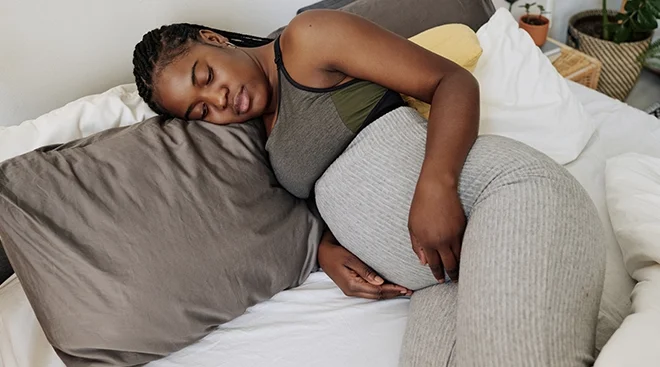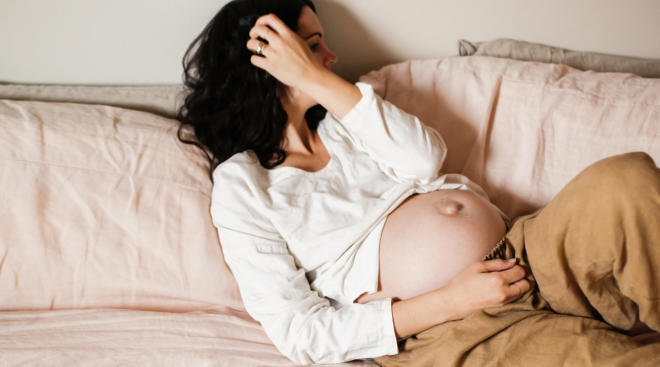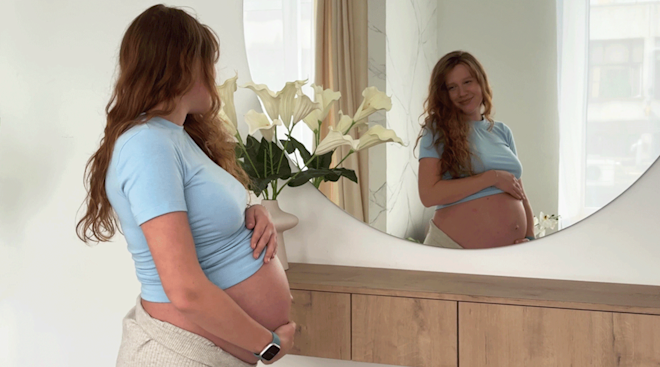How to Deal With Body Aches During Pregnancy
mamas-to-be, a day doesn’t seem to go by without pregnancy aches and pains. Whether it’s pain in a specific area (hello, pelvic pressure!) or more general discomfort, chances are you’ll experience some of this during your nine month journey to motherhood. The good news? Body aches in pregnancy are usually a completely normal reaction to the changes your body is going through. Read on to learn more about what could be causing your discomfort and how you can ease those body aches during pregnancy.
The cause of pregnancy aches and pains is usually two-fold: Your changing body, and all those pesky (but oh-so-important!) hormones. As your growing bump puts excess pressure on your muscles and skeleton, your hormones are also amping up and starting to relax your ligaments. “These factors change your posture and center of gravity to accommodate the growing fetus, while at the same time causing weakening of the abdominal walls and increasing strain on the muscles, which results in a combination of body aches and pains,” explains Talitha Bruney, MD, an ob-gyn at Montefiore Medical Center in New York City.
When it comes to body aches in pregnancy, the most common complaint is definitely back pain, which a whooping 60 percent of pregnant women experience, according to Bruney. But many first-time moms will also experience abdominal aches and pains earlier on in pregnancy, explains Kecia Gaither, MD, an ob-gyn in New York City. “These abdominal pains, termed round ligament pain, are related to the uterus expanding out of the abdominal cavity, and typically resolve well into the second trimester,” she says.
Moms-to-be can also be on the lookout for possible leg, feet, hand, head and joint pain later on in pregnancy. Some of those discomforts may be caused by weight gain or swelling from fluid retention, which can put more pressure on your joints and nerves, Bruney explains.
“Symptoms vary from person to person and may be dependent on their activity level,” Bruney says. “Pregnancy body aches may be worse at the end of the day in a very active mom-to-be who has fatigued muscles, or may be worsened by certain positions, like moving from a sitting to standing position, sitting in an uncomfortable chair or being stationary for prolonged periods.” Aches and pains can occur at any point in pregnancy, but they’re often most bothersome during the third trimester, she adds, since baby is bigger at that stage of pregnancy.
The best way to prevent body aches in pregnancy is by staying active and keeping your pregnancy weight gain in check. (It’s recommended that women of normal BMI gain between 25 and 35 pounds in total.) But even if you’re already suffering from discomfort, moderate exercise like walking has been shown to help reduce pregnancy back pain, Bruney says. You can also take acetaminophen (Tylenol), or pick up a belly support belt. According to Bruney, “in patients with lower back pain and pelvic pain, providing better support to their abdominal wall and muscles can be helpful in relieving some of their symptoms.”
Although body aches in pregnancy are considered normal, it’s still a good idea to chat with your doctor or midwife about them at your next appointment, Gaither suggests. (You’re always better safe than sorry, especially when pregnancy is concerned.) You’ll want to call your doctor right away if the aches are really severe, restrict your movement or include swelling or redness on your legs, Bruney adds, since those can be signs of a possible blood clot. If it’s accompanied by vaginal bleeding, you’ll also want to seek medical attention right away. Also know this: Pregnancy aches and pains usually affect a particular region in the body instead of all over, and they’re not typically associated with other symptoms (like fever, chills or cough)—so if you have any of those, you might be suffering from a cold or flu. In that case, give your primary care doctor a call.
Please note: The Bump and the materials and information it contains are not intended to, and do not constitute, medical or other health advice or diagnosis and should not be used as such. You should always consult with a qualified physician or health professional about your specific circumstances.
Talitha Bruney, MD, is an ob-gyn and the medical director of the Comprehensive Family Care Center in the department of obstetrics and gynecology and women's health at Montefiore Medical Center in New York City.
Kecia Gaither, MD, MPH, FACOG, is a double board-certified OB-GYN and maternal fetal medicine specialist in New York City with more than 20 years of experience. She serves as the director of perinatal services for NYC Health+Hospitals/Lincoln.
Learn how we ensure the accuracy of our content through our editorial and medical review process.
Navigate forward to interact with the calendar and select a date. Press the question mark key to get the keyboard shortcuts for changing dates.




















































